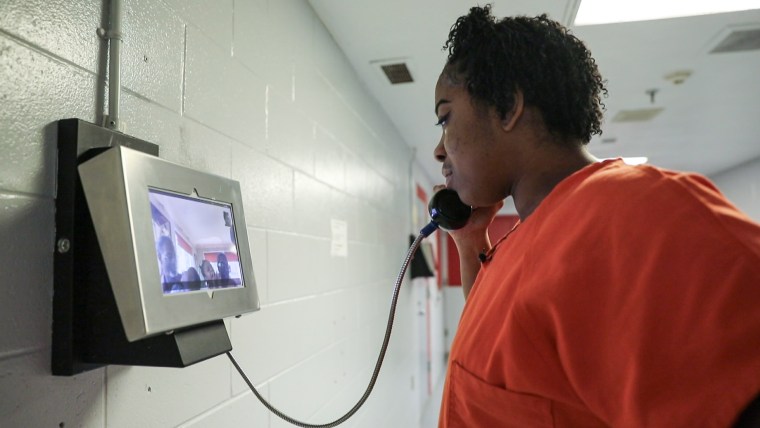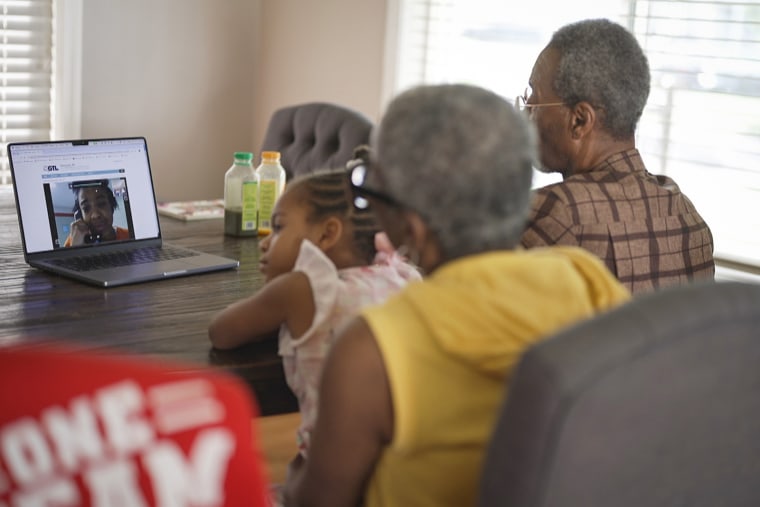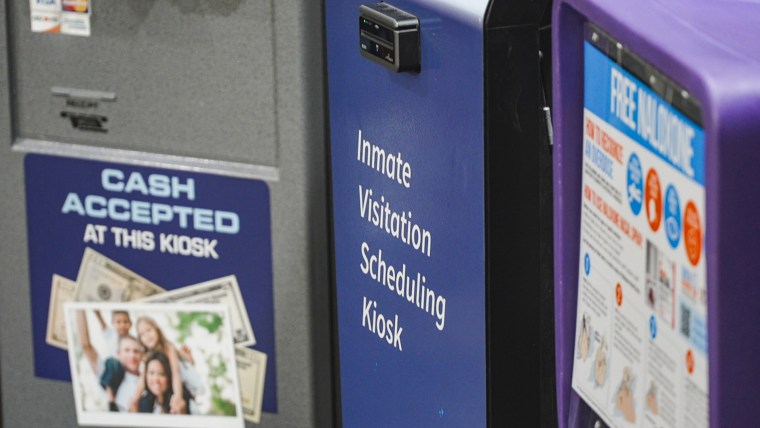Reekila Harris-Dudley had been eagerly awaiting the video call.
At 4 feet, 11 inches tall, she was perched on a plastic crate at the Genesee County jail in Flint, Michigan, positioning herself in front of a screen built into the wall. She shared with NBC News that it was the only way she could wish her daughter a happy fourth birthday face to face.
But the call failed to connect. “It kept saying that the system was down,” the 31-year-old mother recounted. “I cried all day because I was expecting to at least see her and tell her I love her.”
Like thousands of people accused of a crime in counties across America, Harris-Dudley couldn’t see her daughter because Genesee County had abolished in-person visitation in favor of “video visits,” in which families often have to pay for expensive — and critics say, frequently glitchy — video calls.
Get DFW local news, weather forecasts and entertainment stories to your inbox. Sign up for NBC DFW newsletters.

Harris-Dudley’s frustration is not an isolated incident — it reflects a nationwide trend. In recent years, hundreds of jurisdictions around the United States have eliminated in-person visits, making a video screen the only way detainees can see their loved ones.
The financial allure of video visitation was clear to local officials when the technology was first introduced in Genesee County a decade ago. At the time, one county official predicted, “video visitation is going to work. … A lot of people will swipe that Mastercard.”
U.S. & World
Private telecommunications companies such as Securus Technologies and ViaPath (formerly Global Tel*Link) operate the systems, and county governments pocket a portion of the proceeds, according to contracts reviewed by NBC News. Jail administrators across the country saw a benefit to taxpayers, and revenue soared from the calls after in-person visitation was eliminated.
Genesee County’s first video call provider was Securus. In 2018, the county signed a new contract with ViaPath. The ViaPath contract gives the county a minimum annual commission of $180,000 for phone and video rights, plus a $60,000 tech grant and a 20% cut from each video call’s revenue.
An internal email from a county jail administrator involved in negotiating the deal includes his approving remarks about the $60,000 “gift” and “a set guaranteed commission that is more than the average monthly commission we currently get.”
In an interview with NBC News’ Lester Holt, civil rights lawyer Alec Karakatsanis said, “The theory behind these contracts seems to be if you stop kids from visiting their parents in person, these desperate families will be forced to spend more money on phone and video calls.”
Eliminating in-person visits
In February, according to court records, Harris-Dudley was arrested and charged after she allegedly retaliated violently against her son’s father, who she said was abusing her. More than 90 days later, she was still locked up on her daughter’s birthday because she couldn’t afford bail.
In Genesee County, video calls are free — if the “visitor” travels to the jail and uses a screen there. Detainees are given one longer or two shorter at-home calls for free per week. Otherwise, the at-home calls cost $10 for 25 minutes.
Harris-Dudley said the challenge of staying connected with her three children has been emotionally devastating: “It’s very hard for my children to open up over a phone compared to in person.”
Her parents, Brenda and Phillip Dudley, have been looking after her children. Brenda Dudley said that her daughter’s eldest son, now 10, has been particularly affected by the separation. She said he constantly asks about his mother’s return.
“Every day, ‘Where’s Mama? When’s she coming home?’” said Brenda. “It’s hard because they’ll hug me, and I’m not her.”

Although no national database tracks jail visitation policies, a 2015 Prison Policy Initiative (PPI) report shows a significant trend: 74% of jails that implemented video calls also banned in-person visits, like in Michigan where the majority of county jails follow this model.
PPI’s 2015 report — the last major nationwide study of for-profit visitation in correctional facilities — said jail administrators cited increased security as a benefit of eliminating in-person visits, specifically cutting off the flow of contraband from reaching the jail, an argument officials still use today.
But Wanda Bertram, a spokesperson for PPI, noted that jails and prisons use visitation rights as leverage for good behavior. “From a security point of view,” she said, “it’s kind of a terrible idea to remove options for seeing your loved ones.”
Research has shown that visitors are not the primary source of contraband making its way into prisons and jails. One case study at Travis County Jail in Texas found that after officials eliminated in-person visitation in 2013, disciplinary cases regarding smuggled contraband actually increased.
And replacing direct contact with digital communication takes a human toll, experts and advocates say.

Worth Rises, a national criminal justice organization, has long fought to lower the cost of calls from behind bars, and is pushing for legislation to make phone calls free for detainees everywhere in the U.S. “Studies show that people who maintain strong family and community ties find it easier to re-enter society,” said its founder and executive director, Bianca Tylek.
Julie Poehlmann, a professor of human development and family studies from the University of Wisconsin at Madison, has studied the impact of incarceration on families and children for 25 years.
“One hug is worth a thousand video visits,” she said. “Young kids, they need that form of comfort and connection in order to have a deep connection with that parent or family member.”
Poehlmann said that for young children especially, connecting with an incarcerated parent solely through a video call can be a struggle and harmful.
But it is against the law?
The lawsuit
Alec Karakatsanis is now challenging the video-only visitation policy in court, calling it unconstitutional, “painfully inadequate,” and dangerous for society.
In March, Karakatsanis filed two lawsuits against Michigan counties, including Genesee, alleging that the video-only policy violated the civil rights of families. In his filings, he argued that kids have a “right to hug” their parents, and called the abolition of contact visits “akin to torture.”
“Family bonds are absolutely vital to keeping people out of jail once they’re released,” said Karakatsanis, who is suing both the counties and their service providers. “Cutting off the contact that people have with their children and their loved ones makes them more likely to come back into the system later after they leave because it disrupts those family bonds.”
Poehlmann is serving as an expert witness in both lawsuits.
The lawsuit alleges that the visitation policy was strategically implemented the same year paid video calls were introduced, aiming to “maximize revenue” for both the jails and their corporate partners.
In a statement to NBC News, ViaPath emphasized that its technology is not meant to replace in-person visits and that the company did not require any correctional facility to eliminate those visits. “Video visits offer more options for contact with the support networks of incarcerated individuals, including more frequent visits, more visitors per visit, and often extended visitation times. Limitations on any type of communication are at the discretion of the facility.”
A spokesperson for Genesee County’s original contract holder, Securus, said the county is responsible for its visitation policy. “Correctional facilities are responsible for their policies, including the visitation policy that is in the best interest of their security and community needs. Securus then contracts to provide the products and services that support those policies.”
Among Genesee County’s leading proponents of using video visits to raise revenue was Chris Swanson, who at the time was undersheriff and is personally named in the lawsuit.

In 2012, during a meeting with county officials and a Securus representative, Swanson said the system needed to be “a revenue generating machine.”
But in a recent interview with Holt, Swanson — who became the county’s sheriff in 2019 — said he now thinks that his past stance was wrong.
“The person I am today is not the same person I was in 2012, 2014,” Swanson told Holt.
He said George Floyd’s murder began to shift his outlook.
“It was a moment that was pivotal in my life not just as the sheriff, as Chris Swanson.”
In 2020, as people took to the streets across the nation, a video of Swanson went viral as he addressed the protesters. "I want to make this a parade, not a protest,” he told the crowd, and then marched with them.
Since then, said Swanson — who was elected to a full term as sheriff in 2020 and is running for re-election this fall — his perspective has focused more on helping people, instead of just jailing them.
He said the lawsuit has reinforced his new point of view. He said he has come to view the revenue from the video visits as money that comes not from the detainees, but “from their families. And so you’re penalizing people. And I see that now.”
Even though Genesee County lawyers are fighting to have the suit dismissed, Swanson told Holt that he is reintroducing in-person visits starting this summer, calling it “Operation Restoration.” The first Saturday of each month will be for children under 12, and by August a different Saturday will be for people 13 and older.
A judge will now decide whether the case against him and the county will move forward. Whatever the court decides, Swanson said, his mind is already made up.
“This initiative is about restoring families, breaking generational cycles of incarceration and poverty, and instilling hope,” he asserts. “We’re finally aligning with what’s right.”

Attorneys for Genesee County did not respond to a request for comment. In court filings, they have argued that family members do not have a constitutional right to in-person visits with people incarcerated in jail, and that the county implemented the ban to increase security and safety at the jail by preventing visitors from entering with contraband. They have also pointed out that certain detainees are currently able to visit with their families under special circumstances, such as during non-profit led parenting classes.
Lifting the ban, the filings say, would have a “significant impact” on jail staff and resources, and disregards the “adequate” means of communication family members have through video and phone calls.
An attorney for St. Clair County, the other Michigan county Karakatsanis is suing, defended the Securus video visitation system it uses as an “easier and more reliable means of conducting free onsite visits than the old system of visits previously conducted through a glass partition. Also, under the old system, visits were limited to one visit per week supervised by a jail visitation officer. The new technology now allows an unlimited number of remote visits, for a fee, where visitors can conduct the visits literally from anywhere.”
This story first appeared on NBCNews.com. More from NBC News:



